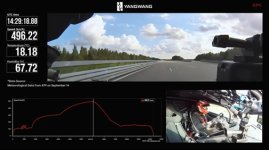What the reports say
- BYD’s Yangwang U9 Xtreme (sometimes called U9X) reportedly hit 496.22 km/h (≈308.4 mph) in a test run at ATP Papenburg in Germany.
- The record is being promoted as a new production car top speed record, surpassing the Bugatti Chiron Super Sport 300+ record (~304.8 mph / ~490.5 km/h)
- The U9 “standard” model specs show it already is a four-motor EV, built on BYD’s e⁴ platform, with the potential for very high output.
- For the record run, the hyper-variant had modifications: 1,200-volt electrical architecture, special semi-slick tires, active suspension tuning, and perhaps a narrower front track or modifications to reduce drag.
So the claim is backed by multiple news outlets, and the sources are treating it as credible (though subject to verification).

Things to check / caveats
When a “record” like this is announced, especially one that breaks major benchmarks, there are several important caveats to examine:
- One-way vs Two-way runs
Many official speed records require runs in both directions and take the average, to cancel out wind / slope effects. It’s unclear whether the 496.22 km/h is a one-way top speed or an average over two directions. Some sources imply it was a one-way run. - Production vs modified car
The “Xtreme” version seems a significantly modified variant of the U9. Even though it's being marketed as a “production” variant, the limited run (only 30 units) and special components (tires, drag reduction changes) may make it more “halo / track variant” than true mass production. - Tires, stability, safety margins
At extreme speeds, the limits of tires, aerodynamic lift, stability, heat, and component stresses become extremely critical. Using custom semi-slick tires, optimizing aerodynamics, and tuning suspension for that run are necessary. Whether the car can sustain that speed repeatedly or in normal conditions is another question. - Verification / independent confirmation
Typically, for a record to become widely accepted, independent measurement verification (by recognized bodies) is needed, including validated instrumentation. We'll have to see if that comes.
My assessment
Given the consistency of multiple credible sources reporting the 496.22 km/h claim, it’s plausible that BYD’s Yangwang U9 Xtreme did hit that speed under controlled test conditions. It likely is a new benchmark for production or near-production EVs, at least in terms of published claims to date.
However, whether:
- It qualifies under the strictest “production car” definitions,
- It can reliably sustain that speed in practical use,
- It’s repeatable or independently verified,
